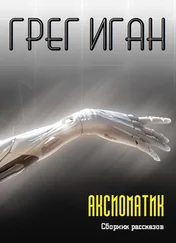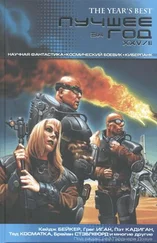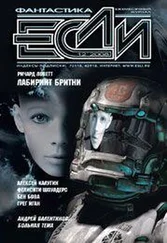Грег Иган - Permutation City
Здесь есть возможность читать онлайн «Грег Иган - Permutation City» весь текст электронной книги совершенно бесплатно (целиком полную версию без сокращений). В некоторых случаях можно слушать аудио, скачать через торрент в формате fb2 и присутствует краткое содержание. Жанр: Фантастика и фэнтези, Киберпанк, на английском языке. Описание произведения, (предисловие) а так же отзывы посетителей доступны на портале библиотеки ЛибКат.
- Название:Permutation City
- Автор:
- Жанр:
- Год:неизвестен
- ISBN:нет данных
- Рейтинг книги:4 / 5. Голосов: 1
-
Избранное:Добавить в избранное
- Отзывы:
-
Ваша оценка:
- 80
- 1
- 2
- 3
- 4
- 5
Permutation City: краткое содержание, описание и аннотация
Предлагаем к чтению аннотацию, описание, краткое содержание или предисловие (зависит от того, что написал сам автор книги «Permutation City»). Если вы не нашли необходимую информацию о книге — напишите в комментариях, мы постараемся отыскать её.
Permutation City — читать онлайн бесплатно полную книгу (весь текст) целиком
Ниже представлен текст книги, разбитый по страницам. Система сохранения места последней прочитанной страницы, позволяет с удобством читать онлайн бесплатно книгу «Permutation City», без необходимости каждый раз заново искать на чём Вы остановились. Поставьте закладку, и сможете в любой момент перейти на страницу, на которой закончили чтение.
Интервал:
Закладка:
He said, "One red atom. One tiny miracle. Is that too much to ask for?"
Maria watched the commands stream across the TVC map: instructions to a single processor to rewrite the data which represented this microscopic portion of the Autoverse.
Nothing happened. The vacuum remained vacuum.
Durham swore softly. Maria turned to the window. The City was still standing; Elysium was not decaying like a discredited dream. But she felt herself break out in a sweat, felt her body drag her to the edge of panic. She had never really swallowed Durham's claim that there was a danger in sharing their knowledge with the other Elysians -- but now she wanted to flee the room herself, hide her face from the evidence, lest she add to the weight of disbelief.
Durham tried again, but the Autoverse was holding fast to its laws. Red atoms could not spontaneously appear from nowhere -- it would have violated the cellular automaton rules. And if those rules had once been nothing but a few lines of a computer program -- a program which could always be halted and rewritten, interrupted and countermanded, subjugated by higher laws -- that was no longer true. Zemansky was right: there was no rigid hierarchy of reality and simulation anymore. The chain of cause and effect was a loop now -- or a knot of unknown topology.
Durham said evenly, "All right. Plan B." He turned to Maria. "Do you remember when we discussed closing off the Autoverse? Making it finite, but borderless . . . the surface of a four-dimensional doughnut?"
"Yes. But it was too small." She was puzzled by the change of subject, but she welcomed the distraction; talking about the old days calmed her down, slightly. "Sunlight would have circumnavigated the universe and poured back into the system, in a matter of hours; Planet Lambert would have ended up far too hot, for far too long. It tried all kinds of tricks to change the thermal equilibrium -- but nothing plausible really worked. So I left in the border. Sunlight and the solar wind disappear across it, right out of the model. And all that comes in is --"
She stopped abruptly. She knew what he was going to try next.
Durham finished for her. "All that comes in is cold thermal radiation, and a small flux of atoms, like a random inflow of interstellar gas. A reasonable boundary condition -- better than having the system magically embedded in a perfect vacuum. But there's no strict logic to it, no Autoverse-level model of exactly what's supposed to be out there. There could be anything at all."
He summoned up a view of the edge of the Autoverse; the atoms drifting in were so sparse that he had to send Maxwell's Demonlooking for one. The software which faked the presence of a plausible intestellar medium created atoms in a thin layer of cells, "next to" the border. This layer was not subject to the Autoverse rules -- or the atoms could not have been created -- but its contents affected the neighboring Autoverse cells in the usual way, allowing the tiny hurricanes which the atoms were to drift across the border.
Durham sent a simple command to the atom-creation sub-process -- an instruction designed to merge with the flow of random requests it was already receiving: inject a red atom at a certain point, with a certain velocity.
It worked. The atom conjured up in the boundary layer, and then moved into the Autoverse proper, precisely on cue.
Durham sent a sequence of a thousand similar commands. A thousand more atoms followed, all moving with identical vectors. The "random inflow" was no longer random.
Elysium was affecting the Autoverse; they'd broken through.
Repetto cheered. Zemansky smiled enigmatically. Maria felt sicker than ever. She'd been hoping that the Autoverse would prove to be unbreachable -- and then, by symmetry, Elysium might have been equally immune to interference. The two worlds, mutually contradictory or not, might have continued on their separate ways.
She said, "How does this help us? Even if you can make this program inject the puppets into deep space, how would you get them safely down to Planet Lambert? And how could you control their behavior once they were there? We still can't reach in and manipulate them -- that would violate the Autoverse rules."
Durham had thought it all through. "One, we put them in a spaceship and drop that in. Two, we make them radio-controlled -- and beam a signal at them from the edge of the model. If we can persuade the cold thermal radiation software to send in a maser beam."
"You're going to sit here and try to design a spaceship which can function in the Autoverse?"
"I don't have to; it's already been done. One of the old plans for contact involved masquerading as 'aliens' from another part of the Autoverse, to limit the culture shock for the Lambertians. We would have told them that there were billions of other stars, hidden from view by dust clouds shrouding their system. The whole idea was immoral, of course, and it was scrapped thousands of years ago -- long before there were sentient Lambertians -- but the technical work was completed and filed away. It's all still there, in the Central Library; it should take us about an hour to assemble the components into a working expedition."
It sounded bizarre, but Maria could see no flaw in the plan, in principle. She said, "So . . . we're crossing space to meet the aliens, after all?"
"It looks that way."
Repetto echoed the phrase. "Crossing space to meet the aliens. You must have had some strange ideas, in the old days. Sometimes I almost wish I'd been there."
+ + +
Maria gave in and learned how to use a mind's eye control panel to switch between her Elysian body and her Autoverse telepresence robot. She stretched the robot's arms and looked around the glistening flight deck of the Ambassador. She was lying in an acceleration couch, alongside the other three members of the crew. According to the flight plan, the robot was almost weightless now -- but she'd chosen to filter out the effects of abnormal gravity, high or low. The robot knew how to move itself, in response to her wishes, under any conditions; inflicting herself with space sickness for the sake of "realism" would be absurd. She was not in the Autoverse, after all -- she had not become this robot. Her entire model-of-a-human-body was still being run back in Elysium; the robot was connected to that model in a manner not much different from the nerve-induction link between a flesh-and-blood visitor to a VR environment, and his or her software puppet.
She flicked a mental switch and returned to the cloned apartment. Durham, Repetto and Zemansky sat in their armchairs, staring blankly ahead; little more than place markers, really. She went back to the Ambassador, but opened a small window in a corner of her visual field, showing the apartment through her Elysian eyes. If she was merely running a puppet in the Autoverse, she wanted to be clear about where her "true" body was supposed to be located. Knowing that there was an unobserved and insensate shop-window dummy occupying a chair on her behalf was not quite enough.
From the acceleration couch, she watched a -- solid -- display screen, high on the far wall of the flight deck, which showed their anticipated trajectory, swooping down on a shallow helical path toward Planet Lambert. They'd injected the ship through the border at the nearest possible point -- one hundred and fifty thousand kilometers above the orbital plane -- with a convenient preexisting velocity; it would take very little fuel to reach their destination, and descend.
She said, "Does anyone know if they ever bothered to rehearse a real landing in this thing?" Her vocal tract, wherever it was, felt perfectly normal as she spoke -- but the timbre of her voice sounded odd through the robot's ears. The tricks being played on her model-of-a-brain to edit out the growing radio time lag between her intentions and the robot's actions didn't bear thinking about.
Читать дальшеИнтервал:
Закладка:
Похожие книги на «Permutation City»
Представляем Вашему вниманию похожие книги на «Permutation City» списком для выбора. Мы отобрали схожую по названию и смыслу литературу в надежде предоставить читателям больше вариантов отыскать новые, интересные, ещё непрочитанные произведения.
Обсуждение, отзывы о книге «Permutation City» и просто собственные мнения читателей. Оставьте ваши комментарии, напишите, что Вы думаете о произведении, его смысле или главных героях. Укажите что конкретно понравилось, а что нет, и почему Вы так считаете.









![Грег Иган - Рассказы [компиляция]](/books/419837/greg-igan-rasskazy-kompilyaciya-thumb.webp)
